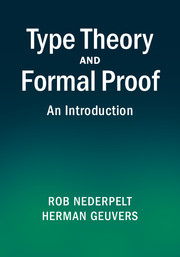Book contents
- Frontmatter
- Contents
- Foreword
- Preface
- Acknowledgements
- Greek alphabet
- 1 Untyped lambda calculus
- 2 Simply typed lambda calculus
- 3 Second order typed lambda calculus
- 4 Types dependent on types
- 5 Types dependent on terms
- 6 The Calculus of Constructions
- 7 The encoding of logical notions in λC
- 8 Definitions
- 9 Extension of λC with definitions
- 10 Rules and properties of λD
- 11 Flag-style natural deduction in λD
- 12 Mathematics in λD: a first attempt
- 13 Sets and subsets
- 14 Numbers and arithmetic in λD
- 15 An elaborated example
- 16 Further perspectives
- Appendix A Logic in λD
- Appendix B Arithmetical axioms, definitions and lemmas
- Appendix C Two complete example proofs in λD
- Appendix D Derivation rules for λD
- References
- Index of names
- Index of definitions
- Index of symbols
- Index of subjects
16 - Further perspectives
Published online by Cambridge University Press: 05 November 2014
- Frontmatter
- Contents
- Foreword
- Preface
- Acknowledgements
- Greek alphabet
- 1 Untyped lambda calculus
- 2 Simply typed lambda calculus
- 3 Second order typed lambda calculus
- 4 Types dependent on types
- 5 Types dependent on terms
- 6 The Calculus of Constructions
- 7 The encoding of logical notions in λC
- 8 Definitions
- 9 Extension of λC with definitions
- 10 Rules and properties of λD
- 11 Flag-style natural deduction in λD
- 12 Mathematics in λD: a first attempt
- 13 Sets and subsets
- 14 Numbers and arithmetic in λD
- 15 An elaborated example
- 16 Further perspectives
- Appendix A Logic in λD
- Appendix B Arithmetical axioms, definitions and lemmas
- Appendix C Two complete example proofs in λD
- Appendix D Derivation rules for λD
- References
- Index of names
- Index of definitions
- Index of symbols
- Index of subjects
Summary
Useful applications of λD
The type theory λD provides a system in which mathematical definitions, statements and proofs can be completely spelled out in a very structured way that is still close to ordinary mathematical practice. This enables and facilitates the formalisation of mathematics and the checking of its correctness. Below, we summarise the main features of type theory, and in particular λD, as a system for formalising mathematics.
Formalisation of mathematics via type theory In λD-like type theory, a mathematical notion can be defined precisely in full detail and the definition can be reasoned with in a logically sound way. The type system enforces a very high level of precision, which gives additional insight into mathematical and logical constructs. Nevertheless, formalising mathematics in λD is still very close to what is standard in mathematics.
Checking of mathematics The high level of precision of type theory greatly improves the level of correctness of the formalised mathematics: incomplete proofs, or proofs using illegal logical steps, are not accepted and a definition has to be syntactically correct. The soundness of course still depends on the axioms that one has assumed: if the axioms do not correspond to what one wants to formalise, or if they are inconsistent, the derived results are still useless. This already applies to informal mathematics, so the formalisation in type theory is separate from the question of whether the axioms are sound.
- Type
- Chapter
- Information
- Type Theory and Formal ProofAn Introduction, pp. 379 - 390Publisher: Cambridge University PressPrint publication year: 2014



